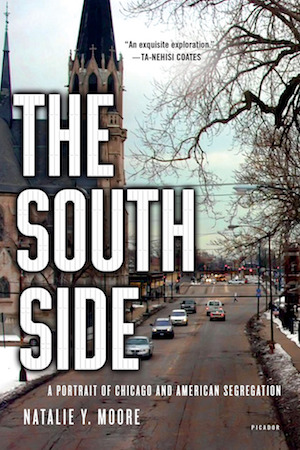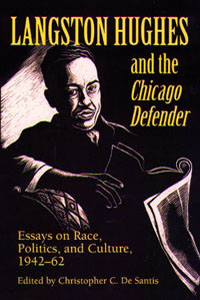 I marked the start of the Martin Luther King holiday by finishing the last few chapters of The South Side: A Portrait of Chicago and American Segregation, by Chicago reporter Natalie Y. Moore. The book explores the continuing persistence and effects of racial segregation America, with a focus on Chicago and especially the city’s South Side, where Moore grew up.
I marked the start of the Martin Luther King holiday by finishing the last few chapters of The South Side: A Portrait of Chicago and American Segregation, by Chicago reporter Natalie Y. Moore. The book explores the continuing persistence and effects of racial segregation America, with a focus on Chicago and especially the city’s South Side, where Moore grew up.
This book has earned wide praise, and has left me with much to consider. It approaches segregation primarily in terms of race, but acknowledges the intersections with class and economics. Which of these is the more important factor if our goal is to be improving racial equity and justice?
It seems important today to remember that Martin Luther King’s primary goal wasn’t racial harmony; it was racial justice. He didn’t preach getting along in order to not make waves. He preached nonviolence as a tool to achieve racial justice. One of my friends shared an interesting article about an artist who is intentionally sharing Dr. King’s statements demanding justice, rather than his statements about nonviolence. Here’s an example:
Because I’ll be damned if I let Martin Luther King Jr. get whitewashed this year.#MLK #MLKday #MartinLutherKingDay #WhiteChurchQuiet #BLM pic.twitter.com/0FH5Tsn9b6
— Daniel Rarela (@DJRarela) January 15, 2017
Our society remains torn apart by racial inequities. It isn’t only Dr. King’s calls for nonviolence that still resonate. This image draws a straight line connecting Dr. King to the on-field kneel-down protests of NFL players:
Because I’ll be damned if I let Martin Luther King Jr. get whitewashed this year.#MLK #MLKday #MartinLutherKingDay #WhiteChurchQuiet #BLM pic.twitter.com/iZUTu9fvfd
— Daniel Rarela (@DJRarela) January 15, 2017
The justice for which Martin Luther King fought remains frustratingly elusive. We need to continue — and redouble — our efforts to achieve it, and I think that is the best way that we can honor King’s legacy. We are just a week away from the second Women’s March, which can serve as a reminder to draw connections and build coalitions among all groups that suffer discrimination. Blacks should not struggle alone. Other racial minorities should not struggle alone. Women should not struggle alone. The LGBTQ community should not struggle alone. We should support each other and work together.
 Meanwhile, I’m pleased to see that my local library has organized a Martin Luther King Jr. film festival including the documentary I Am Not Your Negro, about James Baldwin. If you haven’t seen this documentary, doing so would be a fitting way to mark Dr. King’s birthday. It’s available via streaming and for purchase digitally.
Meanwhile, I’m pleased to see that my local library has organized a Martin Luther King Jr. film festival including the documentary I Am Not Your Negro, about James Baldwin. If you haven’t seen this documentary, doing so would be a fitting way to mark Dr. King’s birthday. It’s available via streaming and for purchase digitally.
A couple of other reading recommendations for the day: March, the graphic autobiography of U.S. Rep. John Lewis (included in my best-of-2017 reading list), and Langston Hughes and The Chicago Defender. I’m always looking for new recommendations myself, so please share any that come to mind.
